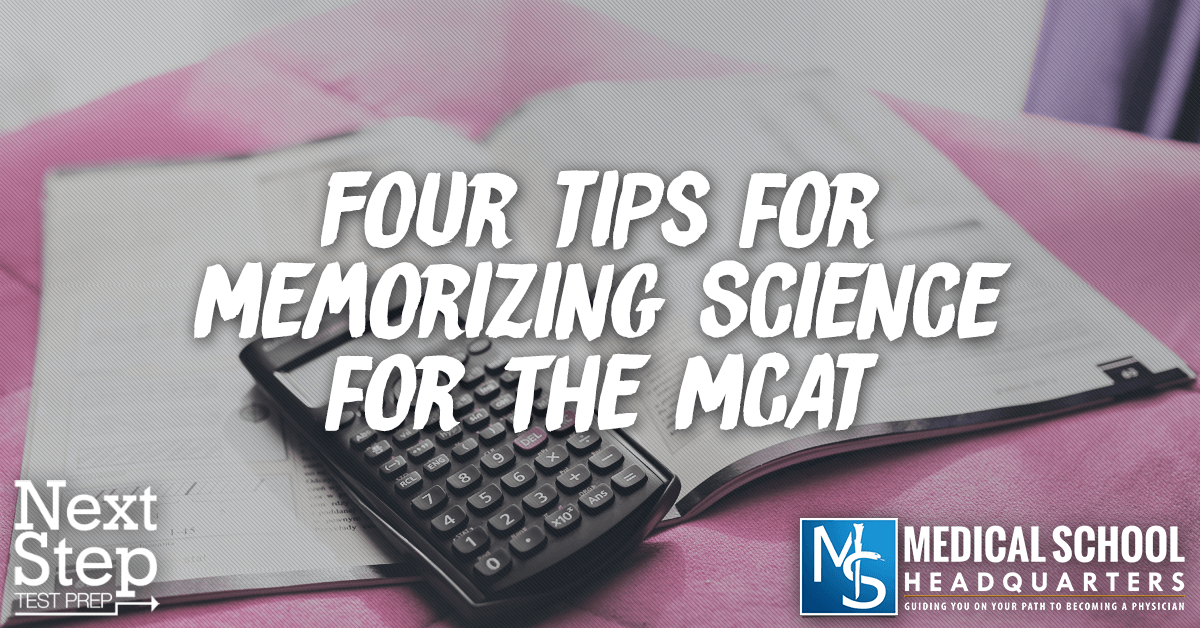Apple Podcasts | Google Podcasts

Session 42
In today’s episode, Bryan and I are going to dive into how you can better memorize the science facts for your MCAT test day considering the sheer volume of things you need to know. If you’re still having trouble memorizing all these amino acids and mnemonics found online, Bryan spills out some secrets to help you finally remember science.
[01:55] Apply What You Learn
Bryan thinks We spend so much time studying psychology, including memory, and often forget to apply it to ourselves. We have to know how memory works for the MCAT and we have to remember that’s how we remember our own stuff.
[Tweet “We spend so much time studying psychology, including memory, and often forget to apply it to ourselves. https://medicalschoolhq.net/mp-42-four-tips-for-memorizing-science-for-the-mcat/”]
Students make the mistake of trying to remember their MCAT science the way they would study for their mid-term for their immunology class like group forced repetition or somebody in the class gave them a mnemonic so they cram all that into their head and spew it back out the next day and promptly forget all of it. This doesn’t work for the MCAT since you have to remember all of it all at once on test day.
[Tweet “Students make the mistake of trying to remember their MCAT science the way they would study for their mid-term for their immunology class. https://medicalschoolhq.net/mp-42-four-tips-for-memorizing-science-for-the-mcat/”]
Therefore, you should be able to use the basic principles of good memorization for the MCAT itself. Today, Bryan walks us through four simple yet incredibly important points.
[03:00] #1: Try different learning modalities.
Engage with the material using different modalities or approaches. Oftentimes, people get so hung up on the visual with those diagrams and tables or flashcards. MCAT books are certainly filled with images so everybody gets completely hung up on the visual. However, not all of us are visual learners.
Instead, try to come up with something auditory such as mnemonics that rhyme or have a rhythm to them. Try to engage with it kinesthetically. Imagine the lever arm in your hand and twerking it by twisting your arm or remember the right hand rule. If you can engage the kinesthetic or the auditory in addition to the visual, you’re much more likely to remember things.
[Tweet “If you can engage the kinesthetic or the auditory in addition to the visual, you’re much more likely to remember things. https://medicalschoolhq.net/mp-42-four-tips-for-memorizing-science-for-the-mcat/”]
A classic auditory learner would approach things is writing song lyrics (just like what my wife, Allison, did while we were studying in medical school.) Even with Bryan the only reason he can name every nation in the world and every state and its capital is because of the song about this in the cartoon show Animaniacs. And to further give you a basic example, we even sing our ABC’s.
[04:57] #2: Tell a story.
Don’t try to memorize isolated facts. Put those facts in context. Make connections between the facts. “Because” is one of the most important words in memorizing MCAT science. The human brain is terrible at remembering a random isolated fact. Whereas if you’re able to make connections, you’re suddenly better at remembering them. Plus the fact that as human beings, we are phenomenally good storytellers. If you could tell a story about the relevant science, you’re much more likely to remember it. Then your repeat this through a process called “elaborative rehearsal” which means you rehearse it over and over again and elaborate each step along the way.
[Tweet “If you could tell a story about the relevant science, you’re much more likely to remember it. https://medicalschoolhq.net/mp-42-four-tips-for-memorizing-science-for-the-mcat/”]
For example, when memorizing electrochemical cells (for which every student hates electrochemistry and this is a universal law of MCAT students), start at one point like the classic mnemonics REDCAT which means “reduction takes place at the cathode.” Repeat that. And then elaborate. Because a reduction reaction has to be paired with an oxidation reaction then oxidation takes place at the anode. So REDCAT (reduction takes place at the cathode). Reduction and oxidation are paired. So oxidation takes place at the anode.
Then add another fact. Reduction is the gain of electrons so electrons have to be flowing to the cathode. Reduction takes place at the cathode. Because reduction is paired with oxidation, oxidation takes place at the anode. And because reductions requires electrons, electrons flow to the cathode. And so on and so forth until you’ve built out a whole little 5-10 minute lecture on electrochemistry. Now, it’s no longer a single isolated fact but a story you’re telling about how a galvanic cell is built. So now you’re much more likely to remember it.
[07:31] #3: Make it personal.
Not only is our brain built to tell a story but they’re also built to store information that has emotional content relating to the people we know. In terms of where we devote time, effort, and energy, number one is other people. We are tribal animals so if you could connect abstract MCAT science to other people, then you’re much more likely to remember it. So instead of an abstract mnemonic, if you could make a mnemonic that relates to your best friend or your family member, or simply place all those personal connections, your likelihood of remembering them is definitely much greater.
Personally create those flashcards and personally try to come up with your own mnemonics instead of taking stuff that’s already created. Craft it yourself so it’s based on your own family and your own story. In fact, the majority of learning with flashcards is actually creating them.
[Tweet “Personally create those flashcards and personally try to come up with your own mnemonics instead of taking stuff that’s already created. https://medicalschoolhq.net/mp-42-four-tips-for-memorizing-science-for-the-mcat/”]
[09:35] #4: Master the basics.
Master the basics rather than learning halfway of everything. It can be intimidating how much is on the MCAT and literally just the AAMC’s official science outline is 125 pages long. And because of that sheer volume of stuff you have to know, the temptation is to just quickly cover everything. However, you’re better off just focusing on 20%-40% of real foundational stuff and make sure you have it mastered backwards, forwards, upside down and sideways than you would be trying to halfway everything. Otherwise you’d be “Jack of all trades, Master of bad MCAT score.” Whereas if you mastered the basics, you can reason your way through much of the MCAT.
[Tweet “You can get so intimidated by the sheer volume of stuff you have to know that the temptation is just to quickly cover everything. https://medicalschoolhq.net/mp-42-four-tips-for-memorizing-science-for-the-mcat/”]
Links:
The Premed Playbook: Guide to the Medical School Interview (Text PREORDER to 44222 to learn more about how to win a free copy by June 4, 2017 and how you can preorder the book and get up to almost $100 worth of giveaways.)
Transcript
Introduction
Dr. Ryan Gray: Would you be interested in a free copy of my book, ‘The Premed Playbook: Guide to the Medical School Interview’? Then you should text the word ‘PREORDER’ to 44222, and I’ll show you how you can enter to win a free copy by June 4, 2017, and learn how you can preorder the book if you so choose, and get up to $100- or close to $100 in some giveaways that I’m giving to people that are preordering the book.
This is The MCAT Podcast, session number 42.
A collaboration between the Medical School Headquarters and Blueprint MCAT (formerly Next Step Test Prep), The MCAT Podcast is here to make sure you have the information you need to succeed on your MCAT test day. We all know that the MCAT is one of the biggest hurdles, and this podcast will give you the motivation and information that you need to know to help get you the score you deserve so you can one day call yourself a medical student.
Welcome to The MCAT Podcast. As I mentioned in the beginning of the episode, if you text the word ‘PREORDER’ to 44222 I’ll show you how you can enter to win a copy, one of fifty that I’m giving away, of my new book ‘The Premed Playbook: Guide to the Medical School Interview.’ It’s being released in paperback on June 6, 2017. The contest, the giveaway ends on June 4, 2017.
Alright so this episode is an interesting one. If you’ve ever had issues memorizing information for the MCAT, specifically science stuff, we’re going to dive into that with Bryan.
Alright Bryan, so let’s say I’ve been studying for the MCAT now for three months, and I still can’t remember all of the amino acids, I still can’t remember all these mnemonics that I find online. What are your secrets to help me finally remember science?
Tip #1 – Engage Using Different Modalities
Bryan Schnedeker: You know that’s a good question. I think there’s a real big irony there that we spend so much time studying psychology, including memory, and often forget to apply it to ourselves, right? We have to know how memory works for the MCAT, but we’ve also got to remember that’s how we remember our own stuff. And the big mistake that comes- Ryan you mentioned, ‘I get these mnemonics online,’ or whatever, is that students make the mistake of trying to remember their MCAT science the way they would study for their midterm for their immunology class, which is just kind of brute force repetition, or somebody in the class gave them a mnemonic, and so they just cram all that into their head, spew it back out the next day, and promptly forget all of it, and that’s not going to fly for the MCAT, right? You have to remember all of it all at once on test day. And so how you do that is use the basic principles of good memorization for the MCAT itself. And so I had four things that I wanted to kind of walk us through. They’re really simple points, but incredible important. Right? So number one is engage with the material using different modalities or approaches. A lot of people tend to get really hung up on the visual; they like diagrams, they like tables, they like flashcards. MCAT books are certainly filled with images, so everybody gets completely hung up on the visual. And not all of us are visual learners, so try to come up with something auditory, mnemonics that rhyme or have a rhythm to them. Try to engage with it kinesthetically. You know imagine the lever arm in your hand, and you’re kind of torqueing it by twisting your arm, or remember the right hand rule, or things like that. If you can engage the kinesthetic, engage the auditory in addition to the visual, you’re much more likely to remember things.
Dr. Ryan Gray: I have a story for that.
Bryan Schnedeker: Sure.
Dr. Ryan Gray: When I was in med school, my wife, a student with me, Allison, she would write song lyrics to learn things. And she would sing them, and that’s how she would study for more in-depth things. For the little stuff she wouldn’t do that, but for the more in-depth things she would write a song and sing it.
Bryan Schnedeker: Yeah absolutely, because I mean that’s a classic auditory learner way to approach things. I mean I still to this day, the only reason I could name every nation in the world, and every state and its capital, is because of the cartoon- the show Animaniacs when I was a little kid had a song for here’s every state and capital, and here’s all the nations in the world, and that was a great little auditory system for remembering those things.
Dr. Ryan Gray: And just to dumb it down- not dumb it down, but to give you a basic example, we sing our ABC’s.
Tip #2 – Don’t Memorize Isolated Facts
Bryan Schnedeker: There you go, exactly. Yup. Okay so engaging different modalities; auditory, visual, kinesthetic. Next number two, don’t try to memorize isolated facts. Put those facts in context, make connections between the facts. The human brain is terrible at remembering a random isolated fact. Like Ryan, quick what’s the capital of North Dakota?
Dr. Ryan Gray: Bismarck.
Bryan Schnedeker: Oh very good, okay so you knew that. See for most people they’d have no idea, right? They were in fifth grade, and their teacher made them memorize all the state capitals, and then they promptly forgot because those facts had no context, no meaning for them, whereas if you have connections, suddenly you’re better at remembering that. And it really gets to the idea that we are phenomenally good as a species, phenomenally good story tellers. And so if you can tell a story about the relevant science, you’re much more likely to remember it. So an example- and then what you do is you repeat it through a process called elaborative rehearsal; you rehearse it over and over again and elaborate each step along the way. The example I often use is electrochemical cells because everyone hates electrochemistry. It’s just like a universal law of MCAT students, nobody likes galvanic and electrolytic cells. So I say- okay look, just start at one point. The classic mnemonic RED CAT, reduction takes place at the cathode. So you start with that fact. RED CAT, reduction takes place at the cathode. RED CAT, reduction takes place at the cathode. Then elaborate. Because a reduction reaction has to be paired with an oxidation reaction, then oxidation takes place at the anode. So RED CAT, reduction takes place at the cathode, reduction and oxidation are paired, so oxidation takes place at the anode. Then add another fact. Okay reduction is the gain of electrons. So electrons have to be flowing to the cathode. RED CAT, reduction takes place at the cathode because reduction is paired with oxidation, oxidation takes place at the anode, and because reduction requires electrons, electrons flow to the cathode. And so on, and so on, and so forth until you’ve built out a whole little five to ten minute lecture on electrochemistry for yourself. And now it’s not just a single isolated fact, it’s a little story that you’re telling about how a galvanic cell is built, and now you’re much more likely to remember it.
Dr. Ryan Gray: So I think you’re onto something here, and this is going to be the next Broadway hit.
Bryan Schnedeker: The RED CAT?
Dr. Ryan Gray: Yeah the RED CAT.
Bryan Schnedeker: Get that guy that did ‘Hamilton’ and tell him to do electrochemistry.
Dr. Ryan Gray: There you go.
Tip #3 – Make it Personal
Bryan Schnedeker: Yeah. And really, point number three ties into point number two. So point number two was make connections, make it a story, and number three is make it personal. Right? We’re- again the idea that our brains are built to tell stories, our brains are also built to store information that has emotional content that relates to people we know. Right? When you think about kind of where we devote time, and effort, and energy, number one is other people. We’re very kind of a very tribal animal. And so if you can connect abstract MCAT science to other people, then you’re much more likely to remember it. And we specifically like mnemonics, right? So instead of just a kind of abstract mnemonic OIL RIG, speaking of reduction and oxidation, if you can make a mnemonic that relates to your best friend or your family member, or kind of plays on those personal connections, you’re much more likely to remember it.
Dr. Ryan Gray: When you’re talking here make it personal, one thing I didn’t hear you say, which I think we’ve talked about previously, is personally creating those flashcards, and personally trying to come up with your own mnemonics instead of taking stuff that’s already created.
Bryan Schnedeker: Right, exactly. Right you’re not going to find a mnemonic online that plays upon some personal foible of your Aunt Sara, right? You have to know like, “Oh she’s really needy and grabby, so I’m going to remember electronegativity by grabbing electrons like Aunt Sara,” or whatever, right? So yeah absolutely craft it yourself so it’s based on your own family and your own story.
Dr. Ryan Gray: But with the flashcard as well, the majority of the learning with flashcards is actually creating them.
Bryan Schnedeker: Yeah you know, and you can go on Anki and get all these premade decks and stuff, and certainly there are plenty out there, and that’s a convenience if you’re like unbelievably strapped for time, but you’re really short-circuiting the value of making them for sure.
Dr. Ryan Gray: Okay. Alright.
Tip #4 – Master the Basics
Bryan Schnedeker: And then the final one, there were four big points, right? So number one is engage different modalities. Number two, focus on the connections between the facts, so ‘because’ is one of the most important words in memorizing MCAT science. Number three, make it personal. And finally number four, master the basics rather than kind of halfway on everything. There’s this intimidation factor with how much is on the MCAT, that stack of MCAT books is enormous, and the list of all the content areas is enormous, and literally just an outline is 125 pages long in the AAMC’s official science outline. It’s actually 128 pages long. So you can get so intimidated by the sheer volume of stuff you have to know that the temptation is to just quickly cover everything, and frankly you’d be better off focusing on the 20% to 30% maybe at most 40% of real foundational stuff, and making sure you have it mastered it backwards, forwards, upside down, and sideways than you would be trying to halfway everything.
Dr. Ryan Gray: Master of- what is it? Jack of all trades, master of none?
Bryan Schnedeker: Yeah so that jack of all trades, master of bad MCAT score. Whereas if you were like- if you’ve absolutely mastered the basics you can reason your way through much of the MCAT.
Dr. Ryan Gray: Jack of all trades, not going to get into med school.
Bryan Schnedeker: Right, exactly.
Final Thoughts
Dr. Ryan Gray: Alright well that sounds like some things I need to work on then to finally learn for the MCAT.
Alright there you have it, another great episode (hopefully) of The MCAT Podcast, helping you memorize science facts. Very interesting and a very needed skill for the MCAT. So hopefully that was helpful for you. I think it was.
Don’t forget, text the word ‘PREORDER’ to 44222, I’ll show you how you can enter to win one of fifty copies of ‘The Premed Playbook: Guide to the Medical School Interview,’ and also show you how you can preorder the book and get almost $100 worth of giveaways.
Have a great week, we’ll see you next time here at The MCAT Podcast.
SEARCH SITE
SEARCH SITE
LISTEN FOR FREE











